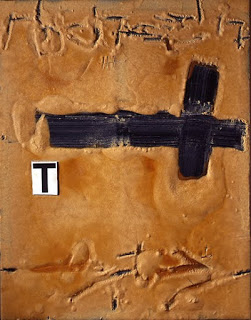Medieval and Renaissance tiles from the Champagne-Aube regions of France tell a great deal about early French society. The wonderful tile collection at the Musée des beaux-arts or the Musée Saint Loup, in Troyes allows one to peep into earlier worlds. Even though this world was underfoot!
Read Moreclay
Connections to the Earth through Art /
Sometimes life brings those wonderful connections and coincidences together to make a point in the art world, at least for me.
Last Tuesday, 7th February, the papers were full of news of the death of the great Spanish painter, Antoni Tapies, at the age of 88. I had always associated his work with the highly imaginative and almost mystical use of all kinds of materials, from clay, marble, sand and earth to cloth, always with an evocation of man's passage through life, with its pain and experiences that were grounded in his Spanish world. I remember being riveted by his use of ochers and other clays in a passionate series of canvases that were exhibited in Mallorca a long time ago.
As was reported in an article in The Nation, in 2004, Tapies spoke about his interest in "deeper, more serious colours" partly because he wanted to "feel close to the earth." "I have always wanted to get closer to the formations of the universe. Deep down, we are made of earth – and we go back to her."
Black I, mixed media, 2007, Image courtesy of Waddington Galleries, London
Tapies at his most tactile and Zen-like.
Then comes the coincidence that I loved: in a February 8th, Wednesday, Diario de Mallorca newspaper, there is a small item of news that forms a wonderful linking circle for me.
The famous Nerja Caves, in Andalucia, Spain, has a wealth of Paleolithic rock paintings dating for the most part between 16,000 and 20,000 years ago.
Rupestrian Art, Nerja Caves, Andalucia
However, it has just been ascertained that six of the rock paintings possibly date from 42,000 years ago, thus placing them amongst the first works of art created by man. Even more interesting is the hypothesis that Neanderthals created these rock paintings, not Homo sapiens. Quite a thought!
So a 20th century Spanish artist working for the most part in Cataluna, just up the east coast of Spain from the Nerja Caves, is hailed for his use of clay and other earths, and his deeply-held beliefs about humankind's mystical bonds with the earth. A few hundred miles and possibly about 42,000 years after early versions of mankind were virtually creating the same kind of mystical marking with the same clay materials. It certainly gives one a sense of perspective about what it is to be an artist.

